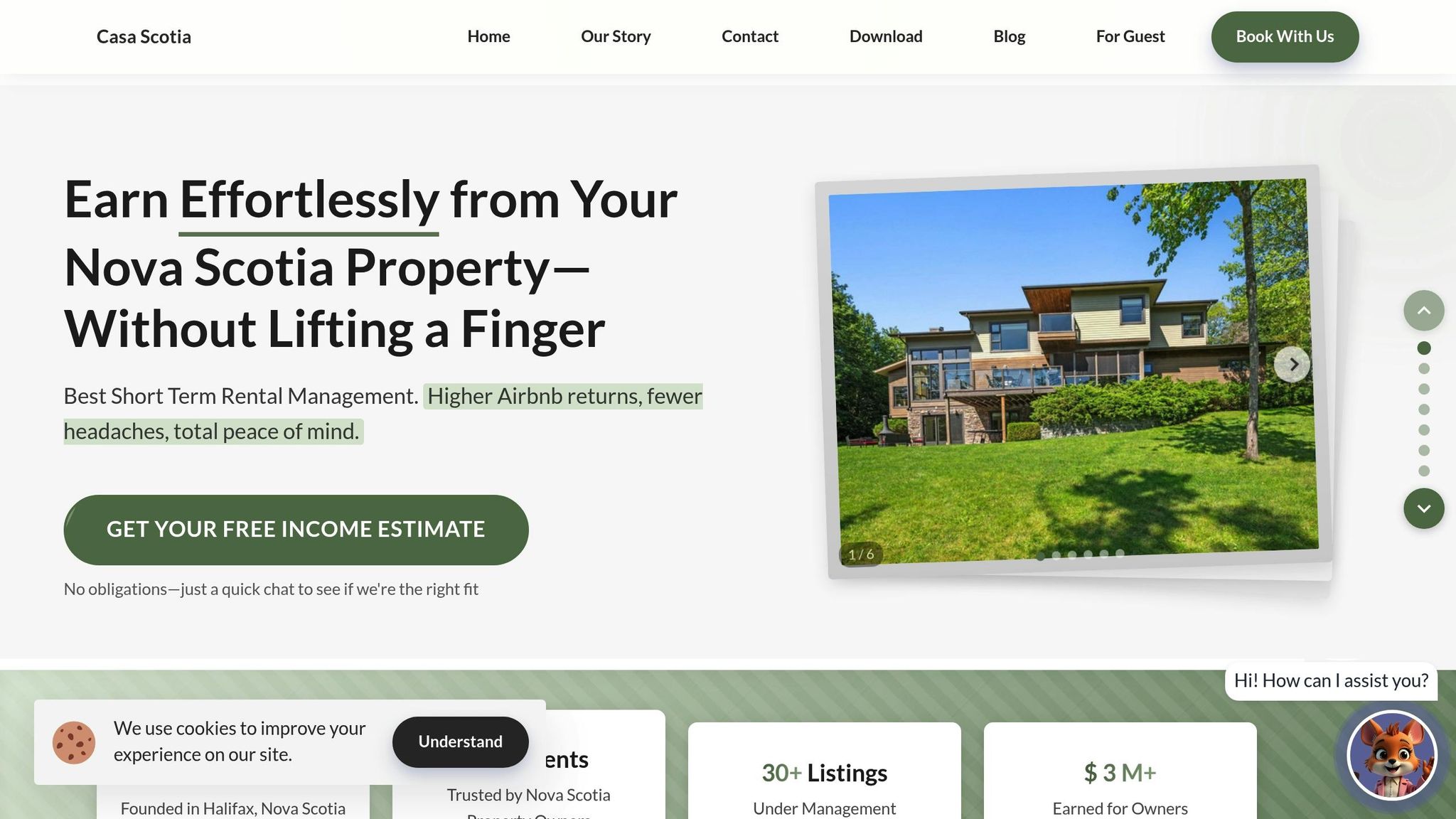Smart technology is transforming short-term rental (STR) management in Nova Scotia. Keyless locks, motion sensors, and smart thermostats simplify property access, improve security, and reduce energy use. These tools also help meet local regulations, enhance guest comfort, and may even reduce insurance costs. Here's what you need to know:
- Smart Locks: Allow remote control, eliminate physical keys, and ensure secure, flexible check-ins.
- Smart Sensors: Monitor motion, noise, water leaks, and environmental conditions to protect your property and ensure compliance with local bylaws.
- Smart Thermostats: Save on energy bills with remote temperature control and scheduling while keeping guests comfortable during Nova Scotia's cold winters.
- Insurance Benefits: Although not guaranteed, smart tech can lower risks, potentially leading to reduced premiums.
These devices not only improve operations but also provide peace of mind for STR owners navigating Nova Scotia’s unique challenges, from harsh winters to strict municipal bylaws.
Comparing the top smart home options for short term rentals
Smart Locks: Better Security and Easy Access
Smart locks have transformed how properties are accessed, removing the hassle of traditional keys. Using digital codes, smartphone apps, or Bluetooth, these devices simplify entry, making them ideal for short-term rentals (STRs), where guests may arrive at any hour. Let’s break down how smart locks work and the perks they offer to both property owners and guests.
How Smart Locks Work
Instead of relying on physical keys, smart locks use digital entry systems. These often include keypads and Wi-Fi or Bluetooth connectivity to manage access. For STR owners, this means the ability to generate temporary access codes for each guest. These codes automatically expire after checkout, ensuring security. Advanced models connect to Wi-Fi, allowing owners to control locks remotely via smartphone apps. Some systems even let guests use their phones as digital keys when nearby.
Installing smart locks is straightforward. It usually involves replacing the existing deadbolt and works with standard door hardware, making the upgrade process relatively simple for most property owners.
Benefits for STR Owners and Guests
The technical features of smart locks translate into real-world advantages for property management. Security is a major benefit: no more worrying about lost or copied keys or unauthorized access by previous guests. Access logs allow owners to track who enters and exits the property, providing an added layer of safety.
Remote management is another game-changer for STR operators. From generating new codes to resolving check-in problems, everything can be handled remotely. This is particularly useful in Nova Scotia, where guests may arrive from different time zones or face travel delays.
For guests, the convenience of contactless entry is a major draw. Reports suggest that by 2025, many travellers will expect keyless entry as a standard feature[2][3]. Guests no longer have to worry about losing keys or coordinating handoffs, a relief during Nova Scotia's unpredictable weather.
Smart locks also shine when it comes to after-hours access. Whether guests arrive during a late-night Halifax snowstorm or leave early for a flight from Stanfield International Airport, they can enter or exit the property without disturbing others or waiting for the owner.
| Feature | Traditional Lock & Key | Smart Lock |
|---|---|---|
| Key Management | Physical keys, risk of loss/duplication | Digital codes, no physical keys needed |
| Access Control | Manual, in-person | Remote, app-based, real-time |
| Guest Experience | In-person handoff | Contactless, flexible check-in |
| Security | Vulnerable to lost/stolen keys | Unique codes, access logs, auto-expiry |
| Integration | None | Can integrate with other smart devices |
Meeting Nova Scotia STR Requirements
Beyond convenience and security, smart locks can help STR owners meet Nova Scotia's safety regulations. These include ensuring that doors can be opened from the inside without a key or special knowledge, a critical requirement of the province’s building and fire safety codes. Owners should also ensure that smart locks do not hinder emergency exits and provide backup access options in case of power or connectivity issues[1].
Backup access is particularly crucial during Nova Scotia's harsh winters, where power outages are not uncommon. Many high-quality smart locks include physical key overrides or battery backups, ensuring guests won’t be locked out during emergencies.
Privacy is another key consideration. Any data collected through access logs must comply with Canadian privacy laws, and guests should be informed about how their data is handled.
When choosing a smart lock, it’s essential to ensure it’s compatible with Canadian door standards and can endure Nova Scotia’s climate. Temperature swings, coastal humidity, and heavy winter conditions can impact electronic components. Opt for locks rated for outdoor use and extreme weather.
Regular maintenance is also key to keeping smart locks reliable. This includes updating access codes between bookings, monitoring battery levels, and checking connectivity. Many smart lock systems send alerts for low batteries or connectivity problems, helping owners stay ahead of potential issues.
Smart Sensors: Monitor and Protect Your Property
Smart sensors keep a constant watch over your short-term rental (STR) property, offering real-time updates on conditions, guest activities, and potential problems before they escalate.
Types of Smart Sensors for STRs
Motion detectors are a key tool for monitoring rental properties. Using infrared technology, they detect movement and notify you of any unexpected activity during vacant periods or confirm guest arrivals. These sensors are advanced enough to differentiate between human movement and other triggers like pets or swaying curtains, minimizing false alarms.
Door and window sensors are essential for tracking property access. They detect when doors or windows are opened or closed, instantly alerting owners to any potential security breaches or unauthorized entries.
Noise sensors monitor sound levels without recording conversations, ensuring guest privacy. They send alerts when noise exceeds set thresholds, helping you address disturbances before they escalate into complaints from neighbours or violations of local noise bylaws.
Environmental sensors focus on conditions like temperature, humidity, smoke, carbon monoxide, and water leaks. For example, water sensors placed near appliances or bathrooms can quickly detect leaks, potentially saving you thousands in flood damage repairs.
Occupancy sensors allow you to monitor the number of people in your property without invading their privacy. These sensors use anonymous detection methods, helping ensure compliance with occupancy limits.
How STR Properties Use Smart Sensors
Smart sensors work as a cohesive system to tackle the unique challenges of managing STR properties remotely. When connected to smartphone apps, they provide real-time notifications and detailed logs, giving property owners unparalleled oversight.
Preventing unauthorized access is one of their standout features. Motion sensors and door/window sensors together can detect break-ins, unauthorized early check-ins, or guests overstaying their bookings.
Protecting against property damage is another critical benefit. Water sensors can detect leaks in high-risk areas like basements or laundry rooms, while environmental sensors can identify temperature changes that might signal HVAC issues or frozen pipes - especially crucial during Nova Scotia's cold winters.
Enhancing guest safety is equally important. Smoke and carbon monoxide sensors provide early warnings of hazardous conditions, while temperature sensors help ensure proper heating during harsh Maritime winters. Some systems can even alert emergency services automatically when dangerous conditions are detected.
Monitoring occupancy compliance becomes simpler with sensors that anonymously track the number of people in the property. This ensures guests adhere to booking agreements, helping owners avoid bylaw violations or insurance complications.
The integration capabilities of these systems make them even more efficient. For instance, a door sensor detecting an entry can trigger motion sensors and adjust smart thermostats to create a welcoming environment. These systems also help ensure compliance with local regulations by coordinating actions seamlessly.
Following Local Bylaws
Beyond operational advantages, smart sensors play a key role in meeting local bylaw requirements in Nova Scotia. Municipalities across the province have specific rules for STRs, and sensor data can provide the documentation needed to prove compliance.
Noise ordinance compliance is a major concern in residential areas like Halifax and Sydney. Noise sensors offer objective data on sound levels, allowing owners to address issues before they lead to complaints or bylaw violations. For example, many residential zones enforce noise limits of 45-55 decibels at night, and these sensors can alert you if those thresholds are exceeded.
Enforcing occupancy limits is another area where sensors shine. Many Nova Scotia municipalities regulate guest numbers based on bedroom count or property size. Anonymous occupancy sensors can provide evidence of compliance during inspections, protecting owners from fines that can exceed $1,000.
Meeting safety codes is streamlined with environmental sensors that monitor smoke, carbon monoxide, and other hazards. Nova Scotia's building codes require functional detectors in all rentals, and smart versions of these devices add value by sending remote alerts and maintaining logs of maintenance and functionality.
Respecting privacy is crucial when using sensors. Canadian privacy laws require that guests are informed about monitoring devices, and sensors should never record audio or video in private areas. Be transparent about sensor locations and purposes in your property listings and check-in instructions.
Data management must align with privacy regulations, which often mandate the deletion of sensor data after a reasonable time unless needed for legal or insurance purposes. Most systems allow you to set automatic data deletion schedules, ensuring compliance while maintaining necessary records.
Finally, regular maintenance is essential to keep sensors functioning properly and meeting regulatory standards. Monthly testing, timely battery replacements, and software updates are key. Many systems even provide reminders for maintenance tasks, keeping you ahead of potential problems.
sbb-itb-b5e1074
Smart Thermostats: Save Energy and Keep Guests Comfortable
Expanding on the convenience of smart locks and sensors, smart thermostats are reshaping short-term rental (STR) management in Nova Scotia. These devices simplify energy management while ensuring guests enjoy a comfortable stay. With remote temperature control, energy efficiency becomes effortless - an essential advantage for Nova Scotia's seasonal rental market. When paired with smart locks and sensors, smart thermostats create a seamless system that balances energy savings with guest satisfaction.
Smart Thermostat Features
Smart thermostats come packed with features that make managing rental properties easier and more efficient. Using smartphone apps, you can remotely control the temperature and humidity of your property, allowing you to adapt to Nova Scotia's unpredictable weather.
- Customisable schedules: Automatically adjust heating or cooling based on occupancy. For instance, reduce energy use when the property is vacant and pre-heat or cool before guests arrive.
- Zone-specific control: Group thermostats by zones to manage different areas of the property individually. This is especially helpful for larger rentals with separate suites or multiple floors, ensuring energy is only used where needed.
- Energy monitoring in real-time: Get detailed reports on energy use for specific rooms or zones, helping you identify and address inefficiencies.
- Smart home integration: Connect with voice assistants like Alexa, Google Assistant, or Siri, making it simple for guests to adjust the temperature with voice commands.
These features not only enhance energy efficiency but also elevate the guest experience, making smart thermostats a valuable addition to any STR.
Cost Savings and Environmental Benefits
The advanced features of smart thermostats translate into direct financial and environmental gains. By automating temperature adjustments, they help cut down on unnecessary heating or cooling, significantly reducing utility bills. For instance, during gaps between guest stays, energy use can be minimised without compromising comfort.
Detailed energy reports provide insights into consumption patterns, enabling you to make smarter decisions that lead to long-term savings. A great example of this comes from Canadian company Mysa. Their smart thermostats have collectively saved over 111,555,000 kilowatt hours of energy - enough to power 10,000 homes for an entire year. With over 145,000 homes in the U.S. and Canada using Mysa devices, the company has earned recognition as one of Canada's 50 fastest-growing Clean Technology companies in 2024 [4].
Beyond cost savings, the environmental benefits are undeniable. Lower energy consumption appeals to eco-conscious travellers, a growing segment of the market. Additionally, utility rebate programs, like those offered by Efficiency Nova Scotia, can help offset the initial cost of installing smart thermostats, making the investment even more appealing.
Nova Scotia Energy Programs and Building Codes
Nova Scotia’s local energy programs and building codes further support the adoption of smart thermostats. Efficiency Nova Scotia provides rebates and incentives for these devices, recognising them as energy-efficient upgrades. These programs help reduce the upfront costs of both purchasing and installing smart thermostats.
For instance, Mysa Smart Thermostats are available starting at $99 USD per unit (Mysa LITE) and go up to $199 USD per unit. Bundle discounts are also available - for example, save $10 per unit when buying three or more, or $20 per unit for five or more [4].
When combined with other smart technologies like locks and sensors, smart thermostats become a cornerstone of effective STR management. They provide energy savings, align with sustainability goals, and ensure guests enjoy a comfortable stay - all critical factors for rental properties in Nova Scotia, especially those managed remotely or with multiple units. Together, these technologies form a comprehensive solution for modern STR operations.
Insurance Benefits of Smart Technology for STRs
Smart technology offers enhanced security and streamlined management for short-term rental (STR) properties. However, the connection between these devices and reduced insurance premiums remains uncertain.
How Smart Tech Reduces Risks
Smart devices can improve security by controlling access and maintaining detailed activity logs, which may serve as evidence if incidents occur. While these features clearly bolster property safety, there’s no definitive proof that they lead to lower insurance premiums.
To better understand the potential impact, consulting with insurance professionals is essential.
Possible Insurance Premium Discounts
Working with Nova Scotia Insurance Brokers
Insurance outcomes can differ significantly depending on the provider and policy. For property owners in Nova Scotia, it’s wise to work with local insurance brokers who are familiar with the STR market. These brokers can help determine if your smart technology aligns with insurer requirements, whether professional installation and monitoring add value, and how to document your investments effectively.
While smart technology can improve property management and support insurance claims, speaking with a trusted insurance expert is key to uncovering any potential benefits. Combine this knowledge with your overall STR management approach to maximize your property’s performance.
Conclusion: Partner with Casa Scotia for Smart STR Management

Smart technology is changing the game for short-term rental (STR) operations in Nova Scotia. Tools like keyless locks, motion sensors, and smart thermostats make it easier to manage access, security, and energy - essential in a region with such unpredictable weather.
But that’s just the start. These technologies also boost efficiency. Remote monitoring and automation mean fewer trips to your property, saving time while ensuring smooth operations and top-notch guest experiences.
On top of that, smart tech helps reduce risks. With detailed logs and monitoring systems, you’re better prepared to handle insurance claims if needed. It’s worth reaching out to local insurance brokers in Nova Scotia to ensure your tech investments align with their policies.
Casa Scotia takes the hassle out of STR management across Nova Scotia. They offer professional staging, dynamic pricing strategies, guest screening, and strict adherence to local regulations. Plus, their owner portal keeps you in the loop with real-time updates and detailed monthly reports. Whether you’re looking for year-round support or seasonal management, Casa Scotia’s local expertise helps you maximize your rental income while still leaving room for personal use.
FAQs
How does smart technology help short-term rental owners in Nova Scotia meet local regulations?
Smart technology offers a practical way for short-term rental owners in Nova Scotia to navigate local regulations and simplify property management. Tools like smart locks and noise monitoring systems not only boost security and convenience but also help ensure guests respect community standards.
Features like automated monitoring can help maintain a quiet and peaceful environment, which can lower the chances of complaints from neighbours. It's also important for property owners to register with the Tourist Accommodations Registry, a requirement for operating short-term rentals in Nova Scotia.
What features should I consider in a smart lock to handle Nova Scotia's challenging weather conditions?
When selecting a smart lock for your short-term rental in Nova Scotia, it's essential to choose one that's built to handle the province's challenging weather conditions. Look for weather-resistant locks designed to endure freezing temperatures, high humidity, and the salty air common in coastal areas. Locks made from sturdy materials with proper seals can help protect internal components from moisture and corrosion.
It's also a good idea to go for battery-powered locks. These ensure your guests can still access the property during power outages, which are not uncommon in harsh weather. Prioritize models with extended battery life and low-battery alerts to maintain consistent performance throughout the year.
Do insurance companies in Nova Scotia provide discounts for short-term rental properties with smart technology?
Yes, some insurance companies in Nova Scotia might provide discounts for short-term rental properties that use smart technology. Devices like keyless locks, motion sensors, and smart thermostats can lower risks related to theft, fire, or water damage. These features not only make properties safer but can also lead to reduced insurance premiums.
To find out if you're eligible for these discounts, reach out to your current insurance provider or consult a local broker. Keep in mind that the savings and qualification criteria will depend on the insurer and the specific smart devices installed in your property.



